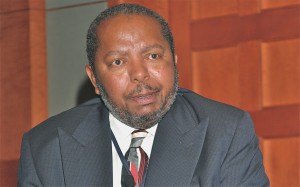Bank of Uganda drops base rate down to 11%

Mutebile said lower inflation in March and less pressure on the shilling influenced their decision to cut the Central Bank Rate.
April 12—Bank of Uganda (BoU) has cut the Central Bank Rate (CBR) by 0.5 percentage points to 11% this month in response to lower inflation during March and business concerns that borrowing costs remain too high.
However, the band on the CBR has been maintained at +/-3 percentage points and the margin on the rediscount rate at 4 percentage points on the CBR. The re-discount rate and bank rate have been reduced to 15% and 16% respectively.
Bank of Uganda Governor, Emmanuel Tumusiime Mutebile, said “The stability of the shilling exchange rate and subdued domestic demand have contributed to the dampening of inflationary pressures.”
Annual headline and core inflation declined to 6.4% and 4.8% respectively in March from the previous 6.7% and 5.7% experienced during February.
In a statement as chair of the Monetary Policy Committee, Mutebile said given that core inflation is forecast to remain around the medium term target of 5% and in line with efforts to support private sector credit and economic growth momentum, “The Bank of Uganda believes there is scope to continue easing monetary policy,” he said.
He however pointed out that achieving the projected GDP growth of 4.5 percent as earlier predicted for 2016/17 is unlikely to be achieved as a result of the weak economic performance in the first two quarters of the current financial year.
“The anticipated lower growth in FY 2016/17 is largely driven by supply side factors, notably the impact of adverse weather conditions on agricultural output. The agricultural sector contracted on average by about 2 percent quarter-on-quarter for four consecutive quarters to the second quarter of 2016/17,” Mutebile said.
Louis Kasekende the Deputy Governor said “We need to improve practices that address all the constraints affecting the whole agricultural sector to ensure a recovery in 2017.”

 African Heads of state head to South Korea next week for Summit talks
African Heads of state head to South Korea next week for Summit talks
 Trading leads as main source of income for Ugandans
Trading leads as main source of income for Ugandans
 New leadership for bankers’ umbrella as total assets top $12 billion
New leadership for bankers’ umbrella as total assets top $12 billion
 Brussels Airlines to announce Nairobi service
Brussels Airlines to announce Nairobi service
 SITA promises enhanced travel experience after Materna acquisition
SITA promises enhanced travel experience after Materna acquisition
 Saudia’s 105 aircraft order stretches A320neo lead over rival Max
Saudia’s 105 aircraft order stretches A320neo lead over rival Max
